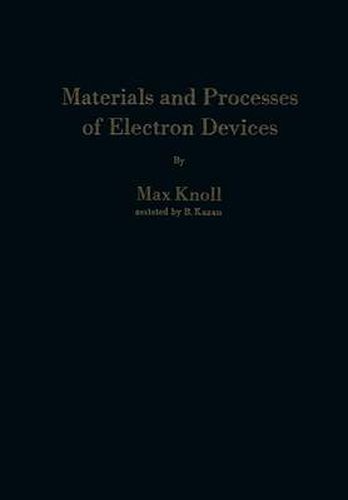Readings Newsletter
Become a Readings Member to make your shopping experience even easier.
Sign in or sign up for free!
You’re not far away from qualifying for FREE standard shipping within Australia
You’ve qualified for FREE standard shipping within Australia
The cart is loading…






This title is printed to order. This book may have been self-published. If so, we cannot guarantee the quality of the content. In the main most books will have gone through the editing process however some may not. We therefore suggest that you be aware of this before ordering this book. If in doubt check either the author or publisher’s details as we are unable to accept any returns unless they are faulty. Please contact us if you have any questions.
This bookis intended to be of assistance to the physicist or engineer concerned with designing and building electron devices such as high-vacuum transmitter- or amplifier tubes, gas- or vapor-filled rectifiers, thyratrons, X-ray or luminescent tubes, glow or incandescent lamps, Geiger- or ionization counters, vacuum photo- cells, photoconductive cells, selenium-, germanium- or silicon rectifiers or trans- istors. For this purpose, extensive information is required concerning the compo- sition, behavior and handling of materials as well as a thorough knowledge of high-vacuum technique necessary for processing electron devices after their assembly. The text covers the preparation and working of materials used in these devices; the finishing methods for vacuum tubes (especially degassing, pumping and getter procedures); and different production steps of solid state devices. This book contains about 2300 references indicated in the text by the author's name and reference number. At the end of each chapter the references themselves are listed alphabetically by the author's name and with the title sometimes abbreviated. In accordance with the purpose of the book, "first" publications are quoted only when they contain up-to-date-knowledge of the subject in question. Patents are treated as references. The quotation of a patent gives only a hint of the technical details described there. Mentioning, or not mentioning, a patent does not imply a statement concerning its importance or validity or warning against imitation. Expired patents are named in addition to ones still valid.
$9.00 standard shipping within Australia
FREE standard shipping within Australia for orders over $100.00
Express & International shipping calculated at checkout
This title is printed to order. This book may have been self-published. If so, we cannot guarantee the quality of the content. In the main most books will have gone through the editing process however some may not. We therefore suggest that you be aware of this before ordering this book. If in doubt check either the author or publisher’s details as we are unable to accept any returns unless they are faulty. Please contact us if you have any questions.
This bookis intended to be of assistance to the physicist or engineer concerned with designing and building electron devices such as high-vacuum transmitter- or amplifier tubes, gas- or vapor-filled rectifiers, thyratrons, X-ray or luminescent tubes, glow or incandescent lamps, Geiger- or ionization counters, vacuum photo- cells, photoconductive cells, selenium-, germanium- or silicon rectifiers or trans- istors. For this purpose, extensive information is required concerning the compo- sition, behavior and handling of materials as well as a thorough knowledge of high-vacuum technique necessary for processing electron devices after their assembly. The text covers the preparation and working of materials used in these devices; the finishing methods for vacuum tubes (especially degassing, pumping and getter procedures); and different production steps of solid state devices. This book contains about 2300 references indicated in the text by the author's name and reference number. At the end of each chapter the references themselves are listed alphabetically by the author's name and with the title sometimes abbreviated. In accordance with the purpose of the book, "first" publications are quoted only when they contain up-to-date-knowledge of the subject in question. Patents are treated as references. The quotation of a patent gives only a hint of the technical details described there. Mentioning, or not mentioning, a patent does not imply a statement concerning its importance or validity or warning against imitation. Expired patents are named in addition to ones still valid.